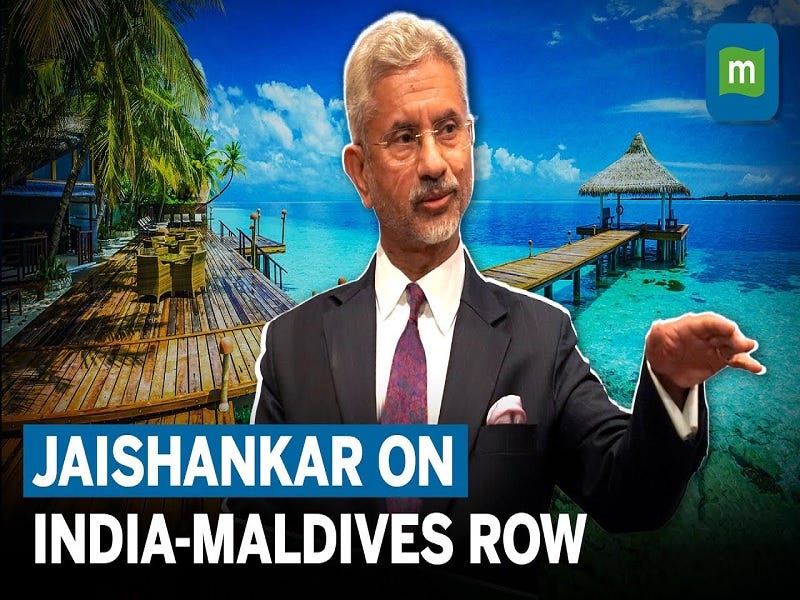External Affairs Minister Jaishankar is one of the world’s top diplomats and keenly understands the nuances of International Relations, hence his regret at Muizzu’s radical anti-Indian policies that are aimed solely at causing as much damage to bilateral ties as possible instead of trying to improve their perceived shortcomings.
Indian External Affairs Minister (EAM) Dr. Subrahmanyam Jaishankar shared his first public reaction to new Maldivian President Mohamed Muizzu’s envisaged ‘decoupling’ of their ties on Saturday. Here’s what said at the Manthan: Townhall meeting in Nagpur:
“Politics is politics. I cannot guarantee that in every country, every day, everybody will support us or agree with us.
But, seriously, as a solution, what we have been trying to do in the last 10 years, with a lot of success, is to build a very strong connect, so that, though the politics may go up and down, the people of the country, the society, generally have good feelings towards India and understand the importance of having good relations with India.
We are involved today in building roads, electricity, transmission, supplying fuel, providing trade access, making investments, and having people holiday in other countries. All these are parts of how you develop those relationships.
Sometimes, things do not go in a good way, and then you have to reason with people to bring things back to where they should be.”
His comments came after a racist row that was sparked by new Maldivian officials’ toxic reaction to Prime Minister Narendra Modi’s recent trip to the union territory of Lakshadweep and were shared a day prior to that country giving India until 15 March to withdraw its forces.
About that, “India’s Military Presence In The Maldives Isn’t As Scandalous As Its New Leader Made It Seem”, with there only being less than 100 of them who are mostly engaged in maintenance and training activities. Muizzu is ideologically driven to decouple their ties, however, and he hyped up and maliciously spun the aforesaid presence to appeal to the “India Out” movement ahead of the last elections. He’s now fulfilling his promise to remove them even though they don’t infringe on Maldivian sovereignty.
Muizzu’s doubling down on this demagogic issue followed his return from China, which itself was preceded by trips to Turkiye and the UAE, with him having yet to visit India despite it traditionally being the first destination of all newly elected leaders. Quite clearly, “The New Maldivian Government Is Obsessed With Spiting India”, which could aversely affect economic ties due to Indian civil society’s boycott of that country’s tourism industry.
He’s apparently betting that Chinese tourists can compensate for the lack of Indian ones and that Turkish ones will chip to help too, but it’s nevertheless always counterproductive for a country to unilaterally decouple itself from its historical partner and neighbor like he’s doing, let alone so quickly. Responsible regional leaders like India understandably lament these processes since they reverse hard-earned progress over the years and could lead to security dilemmas with unpredictable consequences.
In the Maldives’ case, it can’t be ruled out that Muizzu might go so far with his objectively anti-Indian policies that he begins supporting Delhi-designated terrorists-separatists in Kashmir and/or invites that country’s Chinese rival to replace the Indian forces that’ll be withdrawn in less than two months. Either of these scenarios, let alone both, could instantly shift India’s threat assessment of the Maldives. Should that happen, then a tense standoff could ensure, with all that would entail for regional instability.
EAM Jaishankar is one of the world’s top diplomats and keenly understands the nuances of International Relations, hence his regret at Muizzu’s radical anti-Indian policies that are aimed solely at causing as much damage to bilateral ties as possible instead of trying to improve their perceived shortcomings. That leader’s hostility is ideologically driven since no regular leader would risk inflicting such damage to their own country’s interests just to spite another.
Nevertheless, EAM Jaishankar isn’t jumping to conclusions about the future of their ties and writing them off entirely as proven by his remark about how “you have to reason with people to bring things back to where they should be.” It’s therefore expected that India will continue engaging with the Maldives in good faith with the intent of repairing their ties or at least decelerating their mutually costly decoupling, but India isn’t anyone’s fool and will react accordingly to any credible threats to its security.




